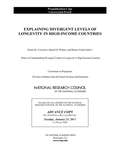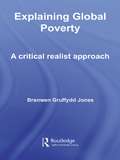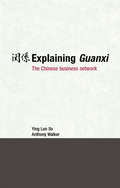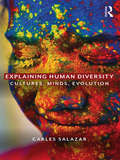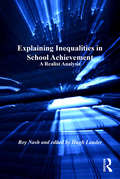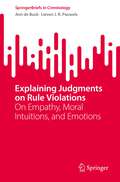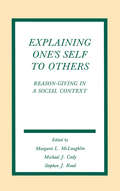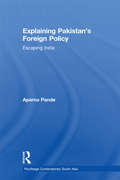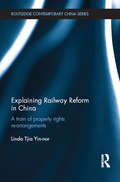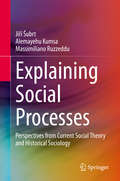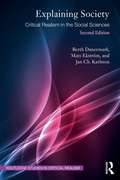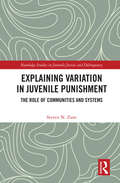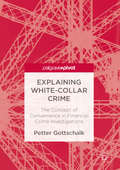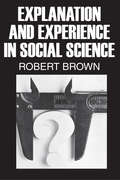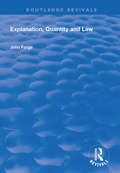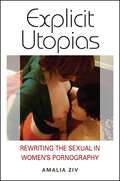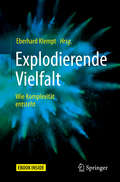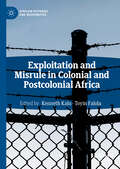- Table View
- List View
Explaining Divergent Levels of Longevity in High-Income Countries
by National Research Council of the National AcademiesOver the last 25 years life expectancy at age 50 in the U.S. has been rising but at a slower pace than in many other high-income countries such as Japan and Australia. This difference is particularly notable given that the U.S. spends more on health care than any other nation. Concerned about this divergence the National Institute on Aging asked the National Research Council to examine evidence on its possible causes. According to Explaining Divergent Levels of Longevity in High-Income Countries the nation's history of heavy smoking is a major reason why lifespans in the U.S. fall short of those in many other high-income nations. Evidence suggests that current obesity levels play a substantial part as well. The book reports that lack of universal access to health care in the U.S. also has increased mortality and reduced life expectancy though this is a less significant factor for those over age 65 because of Medicare access. For the main causes of death at older ages -- cancer and cardiovascular disease -- available indicators do not suggest that the U.S. health care system is failing to prevent deaths that would be averted elsewhere. In fact cancer detection and survival appear to be better in the U.S. than in most other high-income nations and survival rates following a heart attack also are favorable. Explaining Divergent Levels of Longevity in High-Income Countries identifies many gaps in research. For instance while lung cancer deaths are a reliable marker of the damage from smoking no clear-cut marker exists for obesity physical inactivity social integration or other risks considered in this book. Moreover evaluation of these risk factors is based on observational studies which -- unlike randomized controlled trials -- are subject to many biases.
Explaining Global Poverty: A Critical Realist Approach (Routledge Studies in Critical Realism)
by Branwen Gruffydd JonesThe twenty-first century is characterized by extremes of poverty and wealth, of scarcity and abundance. The vast inequalties of wealth distribution between the developed west and the impoverished developing world is a complex problem. This book recognises that Africa in particular has manifested this global disgrace and symbolizes the nature of poverty to the western world. In order to truly emancipate the poverty stricken around the world we must necessarily understand the reasons for its existence. In a departure from traditional critical realist theory, Gruffydd-Jones argues the benefits of reassessing the relevance of objective inquiry and emphasizes its primacy over normative theory in the battle to truly understand the reasons for the African crisis. This approach brings us a book of real relevance for inequality in the modern world and gives us an important platform from which to move forwards in the fight against poverty.
Explaining Guanxi: The Chinese Business Network
by Anthony Walker Ying Lun SoGuanxi, a system of Chinese business relationships, is often described, but is rarely fully understood. Though it seems intangible, there is no doubt that it has contributed significantly to the success of Chinese entrepreneurs and the places where they work. Translated loosely as ‘personal ties’, this simple explanation belies a complex and nuanced system. Guanxi has often been criticised as nepotism - unfair, inefficient, even corrupt, and generally detrimental to business and economic growth… but if it is that bad, how does it survive? This insightful book unravels the origins of Guanxi and provides a much-needed explanation of the phenomena. It investigates: why it was initiated and developed what function it serves how it is maintained why it is such a dominant phenomenon in Chinese business life Combining economics, law and culture, this clear and concise book looks to the future of Guanxi based on its history. Drawing on cultural, organizational and economic studies, it takes a multi-disciplinary approach, integrating these various topics into a coherent explanation of Guanxi ensuring that this illuminating book will be equally useful to students of Asian business as to practitioners working within this market.
Explaining Human Diversity: Cultures, Minds, Evolution
by Carles SalazarWhy are humans so different from each other and what makes the human species so different from all other living organisms? This introductory book provides a concise and accessible account of human diversity, of its causes and the ways in which anthropologists go about trying to make sense of it. Carles Salazar offers students a thoroughly integrated view by bringing together biological and sociocultural anthropology and including perspectives from evolutionary biology and psychology.
Explaining Inequalities in School Achievement: A Realist Analysis
by Roy NashInequalities in educational opportunity have been a persistent feature of all school systems for generations, with conventional explanations of differences in educational attainment tending to be reduced to either quantitative or non-quantitative 'list' theories. In this groundbreaking book, Roy Nash argues that a realist framework for the sociological explanation of educational group differences can, and must be, constructed. A move to such an explanatory framework will allow us to take into account the social influences of early childhood development, the later emergence of social identities, and the nature of the social class impact of educational and career decision-making. By building on the critical analyses of the theories of Bourdieu, Boudon and Bernstein, this book makes a vital contribution to the current policy and theoretical debate about the causes of educational inequality.
Explaining Judgments on Rule Violations: On Empathy, Moral Intuitions, and Emotions (SpringerBriefs in Criminology)
by Ann de Buck Lieven J. PauwelsThis volume highlights the complex relations between empathy, individualizing and groupish moral intuitions, (anticipated) moral emotions, and moral judgment. It is rooted in the notion that human moral systems were not immune to evolutionary processes and thus shaped by biological and cultural evolutionary forces (e.g. natural selection, genetic drift, mutation, sexual selection, cultural mutation, ecological selection pressures, etc.). This edition proposes a conceptual model of both distal and proximal variables to integrate insights from Moral Foundations Theory with theorizing on commitment strategies by linking empathy and moral intuitions to moral emotions (guilt, anger, disgust), and moral judgment in the context of distinct moral violations. The proposed model is tested using data from a convenience sample of young adults in Belgium, who responded to written hypothetical scenarios in a large-scale online survey. This volume is ideal for moral theory researchers in criminology, psychology, and related disciplines
Explaining Long-Term Trends in Health and Longevity
by Robert W. FogelExplaining Long-Term Trends in Health and Longevity is a collection of essays by Nobel laureate Robert W. Fogel on the theory and measurement of aging and health-related variables. Dr. Fogel analyzes historic data on height, health, nutrition, and life expectation to provide a clearer understanding of the past, illustrate the costs and benefits of using such measures, and note the difficulties of drawing conclusions from data intended for different purposes. Dr. Fogel explains how the basic findings of the anthropometric approach to historical analysis have helped reinterpret the nature of economic growth. Rising life expectancies and lower disease rates in countries experiencing economic growth highlight the importance of improving nutrition and agricultural productivity.
Explaining One's Self To Others: Reason-giving in A Social Context (Routledge Communication Series)
by Stephen J. Read Margaret L. McLaughlin Michael J. CodyTo date, the study of communicated explanations has been, at best, unsystematic. There has been little recognition that many, if not most, explanations are eventually delivered to a hearer or hearers. These potential audiences constrain the way the explanation is ultimately shaped. Similarly, researchers have devoted themselves to the study of "accounts," for the most part without an accompanying interest in the fundamental processes of event comprehension. This volume is devoted to bridging the gap between these two traditions.
Explaining Pakistan's Foreign Policy: Escaping India (Routledge Contemporary South Asia Series)
by Aparna PandePakistan has over the decades become a hotbed for the terrorist ideology often referred to as Jihadism. This book investigates the underlying principles of Pakistan’s foreign policy from 1947 until the present day, and explains the rise of Jihadism as an offshoot of Pakistan’s security concerns. The book goes on to discuss that from its inception as a separate state, Pakistan’s foreign policy focused on ‘seeking parity’ with India and ‘escaping’ from an Indian South Asian identity. The desire to achieve parity with its much larger neighbour led Pakistan to seek the assistance and support of allies. The author analyses the relationship Pakistan has with Afghanistan, United States, China and the Muslim world, and looks at how these relationships are based on the desire that military, economic and diplomatic aid from these countries would bolster Pakistan’s meagre resources in countering Indian economic and military strength. The book presents an interesting contribution to South Asian Studies, as well as studies on International Relations and Foreign Policy.
Explaining Railway Reform in China: A Train of Property Rights Re-arrangements (Routledge Contemporary China Series)
by Linda Tjia Yin-norHaving been state-owned for decades, the railway reform in China confused many people, particularly in terms of its ownership and property rights arrangements. Western literature always prescribes that the best model for railway reform is privatization. China’s leadership has also enunciated the state’s determination to re-arrange property rights and rejuvenate corporate governance. But is China’s railway reform really a story of convergence and will the Chinese government follow the western model of railway reform? Addressing these questions, this book provides a positive explanation of the reform in China’s railway sector between 1978 and the dissolution of the Ministry of Railways. It bridges the socialist reform and transport policy literature, and studies the empirical changes of the property rights arrangements in China’s railway system. Refuting the convergence theory, it concludes that the cyclical reform policies of decentralization and re-centralization were actually an exploratory and interactive mechanism of "assets discovery" and "assets recovery". This in-depth study is based on 21 face-to-face interviews with railway cadres as well as field trips to collect first-hand information in Guangzhou, Beijing, Shanghai, Tianjin and Wuhan. As one of the only empirical studies on the reform of the railway sector in China, this book will be of interest to students and scholars of China studies, Transport studies and Political Economy.
Explaining Social Behavior
by Jon ElsterIn this new edition of his critically acclaimed book, Jon Elster examines the nature of social behavior, proposing choice as the central concept of the social sciences. Extensively revised throughout, the book offers an overview of key explanatory mechanisms, drawing on many case studies and experiments to explore the nature of explanation in the social sciences; an analysis of the mental states - beliefs, desires, and emotions - that are precursors to action; a systematic comparison of rational-choice models of behavior with alternative accounts, and a review of mechanisms of social interaction ranging from strategic behavior to collective decision making. A wholly new chapter includes an exploration of classical moralists and Proust in charting mental mechanisms operating 'behind the back' of the agent, and a new conclusion points to the pitfalls and fallacies in current ways of doing social science, proposing guidelines for more modest and more robust procedures.
Explaining Social Processes: Perspectives from Current Social Theory and Historical Sociology
by Jiří Šubrt Alemayehu Kumsa Massimiliano RuzzedduThis textbook considers understanding social processes to be the main task of sociology. From this perspective its authors demonstrate and explain problems which they consider to be crucial for contemporary social science. These are topics of a theoretical and epistemological nature, which are nevertheless closely connected with social development and issues arising from it. The book moves from the more general theoretical questions and dilemmas raised by key social thinkers, such as those connected with the concepts of actor, agency, institutions, structures and systems. It then leads to theoretical reflections on long-term developmental processes associated with the phenomena of power and life in current societies, including globalization, identities, migration, etc. It provides a comprehensive approach to the essential questions of sociology. Lucidly written and including the latest sociological perspectives, this book will find wide appeal among social science students and researchers, and is also for the socially aware general reader.
Explaining Society: Critical Realism in the Social Sciences (Routledge Studies in Critical Realism)
by Jan Ch. Karlsson Berth Danermark Mats EkströmFully revised, with an updated bibliography and new, relevant illustrative examples based on work inspired by critical realism, this new edition of Explaining Society constitutes an up-to-date resource connecting methodology, theory, and empirical research. Including discussions of more recent scholarship in the field which connects critical realism with interdisciplinary research, this second edition also clarifies concepts – such as retroduction and retrodiction – so as to render them consistent with developments within critical realism, which are covered in a new chapter. An accessible account of the nature of society and social science, together with the methods used to study and explain social phenomena, Explaining Society will appeal to scholars of sociology, philosophy, and the social sciences more broadly.
Explaining U.S. Imprisonment
by Mary F. BosworthExplaining U.S. Imprisonment examines women in prison, minorities, the historical path to the modern prison, a wide range of contemporary issues, and social influences on prison reform. While focusing on prisons, this one-of-a-kind book is written within the context of the sociology of punishment and covers cutting-edge topics such as detaining immigrants, the War on Terror, and prison in the 21st century.FeaturesUses a historical and social framework to place U.S. corrections and imprisonment policies in contextIncludes first-hand accounts from inmates, as well as primary source documents written by early prison reformersIntegrates research on women, men, and minorities throughout, rather than separating each topic into a stand-alone chapterBegins chapters with thought-provoking quotes to set the stage for the content that followsExplaining U.S. Imprisonment is ideal for use as a supplementary text in undergraduate and graduate courses on corrections, imprisonment, and theories of punishment. It is also appropriate for use in courses on criminal justice, incarceration, minority issues in law, sociology of law, and the study of the modern prison system.
Explaining Variation in Juvenile Punishment: The Role of Communities and Systems (Routledge Studies in Juvenile Justice and Delinquency)
by Steven N. ZaneThis research monograph provides a comparative analysis of juvenile court outcomes, exploring the influence of contextual factors on juvenile punishment across systems and communities. In doing so, it investigates whether, how, and to what extent macro-social context influences variation in juvenile punishment. The contextual hypotheses under investigation evaluate three prominent macro-sociall theoretical approaches: the conflict-oriented perspective of community threat, the consensus-oriented perspective of social disorganization, and the organizational perspective of the political economy of the juvenile court. Using multilevel modeling techniques, the study investigates these macro-social influences on juvenile justice outcomes across nearly 500 counties in seven states—Alabama, Connecticut, Missouri, Oregon, South Carolina, Texas, and Utah. Findings suggest that the contextual indicators under investigation did not explain variation in juvenile court punishment across communities and systems, and the study proposes several implications for future research and policy. This monograph is essential reading for scholars of juvenile justice system impact and reform as well as practitioners engaged in youth policy and juvenile justice work. It is unique in taking a comparative perspective that acknowledges that there is no one juvenile justice system in the United States, but many such systems.
Explaining White-Collar Crime
by Petter GottschalkThis book introduces 'convenience' as the key concept to explain financial crime by white-collar criminals. Based on a number of fraud examination- reports from the United States and Norway, the book documents empirical evidence of convenience among white-collar criminals. It advances our understanding of white-collar crime by drawing attention to private investigation reports by fraud examiners and financial crime specialists, who are in the growing business of fraud investigations. Reports of investigations have never before been researched in terms of white-collar criminals nor crime convenience. Reports of investigations by auditing and law firms represent a valuable empirical basis - in addition to court documents and other sources of information about financial crime. A methodical and well-researched study, this book will be of particular interest to scholars of criminological theory and law - in addition to ethics courses in business schools.
Explanation and Experience in Social Science
by Robert BrownAccording to their critics, social scientists rarely ask the right questions and cannot provide satisfactory answers even to the questions they ask themselves. Social scientists often discuss the nature of knowledge in their fields with a notable lack of clarity. Explanation and Experience in Social Science by Robert Brown dispels the confusion with cogency and wit; it is a systematic, sensible, and lucid analysis of the nature of the explanations put forward by social scientists.Explanation-making is first distinguished from "describing" and "reporting," and then classified into different types, based on different kinds of information used. The greater part of the book consists in discussion and examination of these types of explanation and their relationships, in which the usefulness and limitations of each are assessed. An extraordinary variety of examples from contemporary work in all the social sciences is used, including the fields of sociology, anthropology, psychology, history, demography, political science. and economics. The author makes it clear that good social explanation is possible and that it conforms to the requirements of all good scientific explanation.Explanation and Experience in Social Science is of interest to the practicing scientist--in fact--it is a must-have for any personal or public library with collections in the social sciences. Most studies in the philosophy of the sciences, natural and social, fall into two distinct groups: those written by philosophers for other philosophers and those produced by scientists for their fellow-scientists. The aim of this book is to discuss questions of philosophical interest as they come to be imbedded in the work of social scientists.
Explanation, Quantity and Law (Routledge Revivals)
by John ForgePublished in 1999, this work sets out to give an account of explanation which is adequate to the problems that arise when looking at physical science. It offers a theory of explanation with supporting analysis, and also an application to the task of giving an account of explanation in quantum mechanics.
Explanatory Pluralism
by C. MantzavinosExplaining phenomena is one of the main activities in which scientists engage. This book proposes a new philosophical theory of scientific explanation by developing and defending the position of explanatory pluralism with the help of the notion of 'explanatory games'. Mantzavinos provides a descriptive account of the explanatory activity of scientists in different domains and shows how they differ from commonsensical explanations offered in everyday life by ordinary people and also from explanations offered in religious contexts. He also shows how an evaluation and a critical appraisal of explanations put forward in different social arenas can take place on the basis of different values. Explanatory Pluralism provides solutions to all important descriptive and normative problems of the philosophical theory of explanation as illustrated in sophisticated case studies from economics and medicine, but also from mythology and religion.
Explicit Utopias: Rewriting the Sexual in Women's Pornography
by Amalia ZivExplicit Utopias explores a problem that has long haunted feminist, lesbian, and queer critics: the obstacles to imagining women's desire and sexual agency. Pornography is one arena in which women have actively sought to imaginatively overcome this problem, yet pornography has also been an object of passionate feminist contention. Revisiting the feminist sex wars of the 1980s, Amalia Ziv offers a comprehensive and thoughtful reassessment of the arguments and concerns of both camps, tying these early debates to the contemporary surge of concern over the pornification of culture. She also sets out to rectify the lack of critical attention to marginal sexual representations by examining the feminist, queer, and psychoanalytic literature on several key issues, including fantasy, the phallus, identification, and gender performativity.
Explodierende Vielfalt: Wie Komplexität entsteht
by Eberhard KlemptVerstehen wir die Welt? Wie ist unsere Welt entstanden? Warum gibt es so viel Materie und so wenig Antimaterie? Wie bildeten sich die weiträumigen Strukturen in unserem Universum? Und wie entstanden aus der unbelebten Materie die ersten reproduktionsfähigen Lebewesen? Welcher Anpassungsdruck erzeugte die Artenvielfalt und letztlich die Hominiden? Wie entwickelten sich Bewusstsein, Kreativität, Religion? In dem vorliegenden Buch beantworten herausragende Wissenschaftler diese und viele weitere spannende Fragen und erklären, wie aus einfachen Anfängen und simplen Regeln immer wieder komplizierte Strukturen entstanden sind. Diese sogenannte Selbstorganisation wird an Beispielen aus den verschiedensten Disziplinen demonstriert – sei es bei der Geburt des Universums, auf der Ebene der Quarks und der Atome, bei der Entstehung des Lebens und bei seiner Ausdifferenzierung in die Vielzahl der Lebensformen bis hin zum Menschen selbst, mit seinen kulturell und wissenschaftlich immer höher entwickelten Gesellschaften. Interessierte Leser können mit Hilfe dieses Buches nachvollziehen, mit welchen Erkenntnissen und Thesen die Wissenschaft heute erklärt, wie die Natur mit einfachen Grundbausteinen und Gesetzen solch komplexe Gefüge geschaffen hat.
Explodobook: The World of 80s Action Movies According to Smersh Pod
by John RainThe 1980s. A time of fear: fear of the unknown, fear of your neighbours, fear of drugs, fear of sex, fear of strangers, fear of videos, and the very real fear that the world would end at any moment in an awful, and very sudden, nuclear attack. However, in those times of turmoil and worry, there was a comfort that soothed the mind, and acted as a quiet balm: action movies. Video shops were bursting at the seams with rampant gunfire, sex, drugs, rock, roll, cars on fire, people on fire, guns, bombs, and people dressed in army fatigues (and that was just the staff). Heroes were born shrouded in fire and violent revenge, they were not only armed with guns, but also red-hot quips, that served as a muscly arm around the shoulder, and a wink that everything was going to be okay. So thank you Arnold, Sylvester, Sigourney, Bruce, Eddie, Charles, Patrick, Mel, Chuck and everyone else that made it happen. You saved the world, in your own inimitable way. Join John Rain, the author of the critically-acclaimed Thunderbook: The World of Bond According to Smersh Pod, as he examines a choice selection of the greatest action movies from the decade when the explosion was king.
Exploitation and Misrule in Colonial and Postcolonial Africa (African Histories and Modernities)
by Toyin Falola Kenneth KaluThis book offers new perspectives on the history of exploitation in Africa by examining postcolonial misrule as a product of colonial exploitation. Political independence has not produced inclusive institutions, economic growth, or social stability for most Africans—it has merely transferred the benefits of exploitation from colonial Europe to a tiny African elite. Contributors investigate representations of colonial and postcolonial exploitation in literature and rhetoric, covering works from African writers such as Ngugi wa Thiong’o, Kwame Nkrumah, and Bessie Head. It then moves to case studies, drawing lines between colonial subjugation and present-day challenges through essays on Mobutu’s Zaire, Nigerian politics, the Italian colonial fascist system, and more. Together, these essays look towards how African states may transform their institutions and rupture lingering colonial legacies.
Exploited: The heartbreaking true story of a teenage girl trapped in a world of abuse and violence
by Maggie HartleyFourteen-year-old Hannah comes to live with foster carer Maggie Hartley after her mum pleads with Social Services to take her into care, unable to cope with her daughter anymore. Previously a good student, a loving daughter and sister, Hannah is now playing truant, drinking, and taking drugs. Angry and mistrustful, it seems that nobody can reach this troubled teenager.Maggie is used to difficult teenagers, but Hannah's behaviour brings into question everything Maggie has ever learnt in all her years as a foster carer. Determined to push away everyone around her away, Hannah's life seems to be spiralling out of control. But when Hannah finally breaks down and confides a shocking secret to Maggie, the truth behind her chaotic behaviour is finally revealed. Can Maggie help this vulnerable young girl overcome the trauma of what's happened to her and set her free from the demons that haunt her?
Exploited: The heartbreaking true story of a teenage girl trapped in a world of abuse and violence (A Maggie Hartley Foster Carer Story)
by Maggie HartleyFourteen-year-old Hannah comes to live with foster carer Maggie Hartley after her mum pleads with Social Services to take her into care, unable to cope with her daughter anymore. Previously a good student, a loving daughter and sister, Hannah is now playing truant, drinking, and taking drugs. Angry and mistrustful, it seems that nobody can reach this troubled teenager.Maggie is used to difficult teenagers, but Hannah's behaviour brings into question everything Maggie has ever learnt in all her years as a foster carer. Determined to push away everyone around her away, Hannah's life seems to be spiralling out of control. But when Hannah finally breaks down and confides a shocking secret to Maggie, the truth behind her chaotic behaviour is finally revealed. Can Maggie help this vulnerable young girl overcome the trauma of what's happened to her and set her free from the demons that haunt her?
